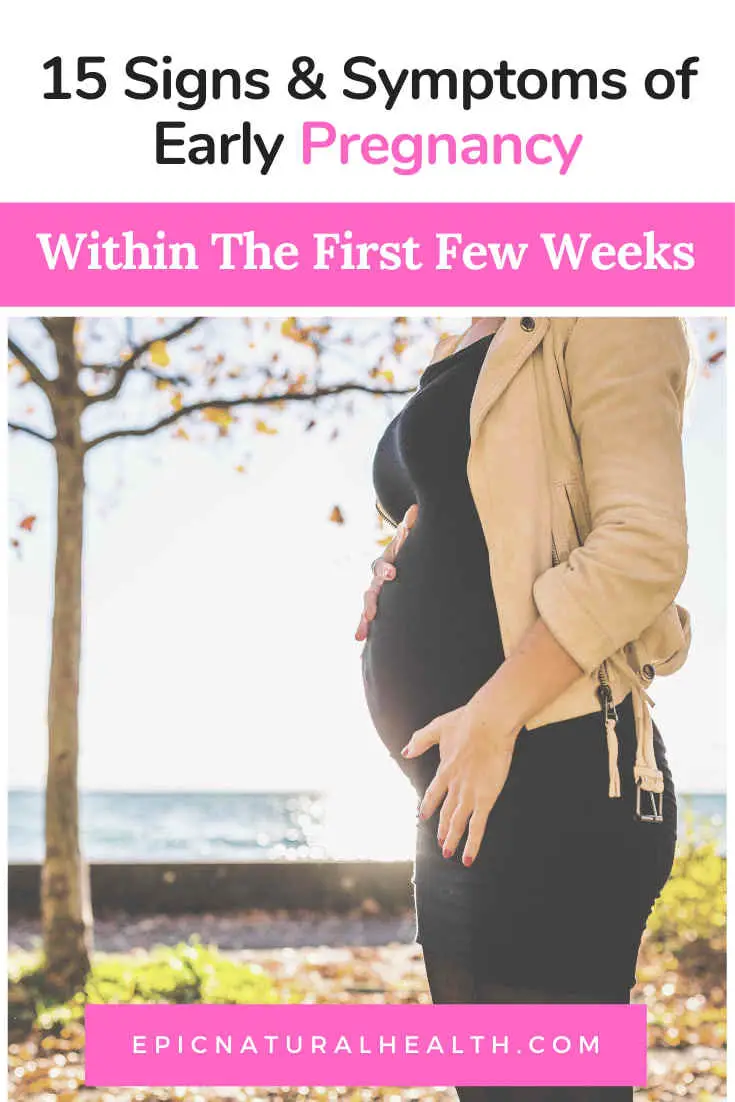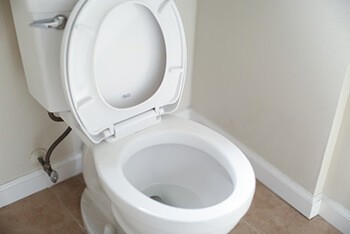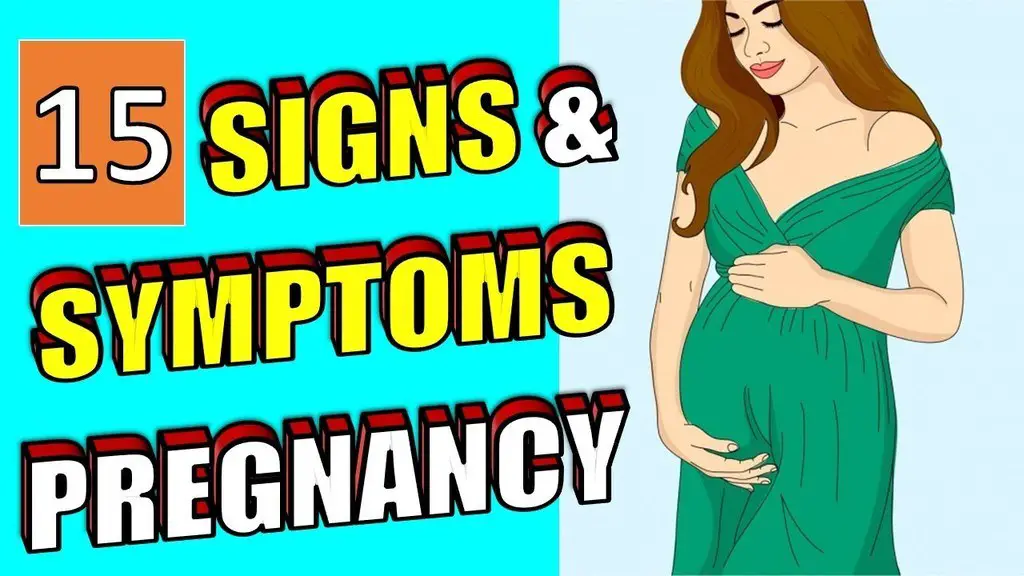Knowing the signs and symptoms of pregnancy is important whether you’re looking to fall pregnant or not. For some women, certain symptoms are a sure indication of pregnancy, while other women may only experience one or two symptoms that are less noticeable.
Your body is incredibly clever in that it can give you subtle hints that you’re pregnant before you’d even be able to pick it up on a test. We’ll be covering all the signs and symptoms of pregnancy to look out for in this video.
1. Tender, swollen breasts
Your breasts may provide one of the first symptoms of pregnancy. As early as two weeks after conception, hormonal changes may make your breasts tender, tingly, or sore. Additionally, your breasts may feel fuller and heavier. Some pregnant women report that their breasts were so uncomfortable that even touching them caused a sudden burst of pain.
Of course, hormonal changes that come from starting your period can also cause breast tenderness, so don’t judge your likelihood of pregnancy off this symptom alone.
2. Fatigue

Feeling tired or fatigued also ranks high among early symptoms of pregnancy. During your very beginning stages of pregnancy, levels of a hormone called progesterone skyrocket. In high enough doses, progesterone can put you to sleep – almost as if it knows that you won’t be getting much of it at all nine months down the line!
At the same time, lower blood sugar levels, lower blood pressure, and increased blood production may team up to sap your energy during your pregnancy. So if you find yourself absolutely wiped out by the afternoon, or taking frequent naps all of a sudden, you may be pregnant.
3. Slight bleeding or cramping

Bleeding during pregnancy isn’t normally a good sign, apart from during your first few weeks after conception. Sometimes a small amount of spotting or bleeding is even one of the first symptoms of pregnancy.
It’s known as implantation bleeding and happens when the fertilised egg attaches to the lining of the uterus, about 10 to 14 days after fertilisation. This type of bleeding is usually a bit earlier, spottier, and lighter in colour than a normal period and doesn't last as long.
4. Nausea with or without vomiting
Morning sickness, which can strike at any time of the day or night, is perhaps one of the most well-known signs of pregnancy. Unfortunately, this means that you’ll probably experience a bit of morning sickness yourself when you first fall pregnant.
For some women, the queasiness begins as early as two weeks after conception. Nausea seems to stem at least in part from rapidly rising levels of oestrogen, which causes the stomach to empty more slowly.
Pregnant women also have a heightened sense of smell, so various odours - such as foods cooking, perfume, or cigarette smoke - could cause waves of nausea in early pregnancy. Combatting morning sickness is possible, though some women experience it a lot worse than others.
5. Food aversions or cravings

One of the most interesting things about being pregnant is developing cravings and aversions to the most unexpected of foods. When you first fall pregnant, you might find yourself turning up your nose at certain foods, such as coffee or fried foods.
Meat, eggs, milk, onions, and spicy foods are all popular turn-offs for pregnant women, too. For some women, just the smell of certain foods is enough to make them sick.
Food cravings are just as common during early pregnancy. Like most other symptoms of pregnancy, these food preferences can be chalked up to hormonal changes - especially in the first trimester, when hormonal changes are the most dramatic.
Peanut butter, chocolate, ice cream, and even plain old ice are popular cravings amongst pregnant women. Some women actually crave spicy foods, too, as opposed to finding them unpleasant.
6. Headaches

Early in pregnancy, increased blood circulation caused by hormonal changes may trigger frequent, mild headaches. Headaches are common in the first trimester, and can even be a sign of hunger or dehydration, or associated with caffeine withdrawal.
If you’re struggling with headaches during pregnancy, it may help to massage your shoulders and neck or hold an ice pack to your head. Your headache might also be caused by an increase in blood sugar, which you can maintain by eating smaller, more frequent portions throughout the day.
7. Constipation
Constipation is another common early symptom of pregnancy. An increase in progesterone causes food to pass more slowly through the intestines, which can cause changes to toilet habits. Signs of constipation include having fewer than three bowel movements per week, bloating, and painful bowel movements.
For some women, constipation lasts throughout pregnancy as hormone levels peak. Changing up your dietary and exercise habits may help you to experience some relief if your constipation doesn’t go away on its own.
8. Mood swings
The flood of hormones in your body in early pregnancy can make you unusually emotional and weepy. Mood swings also are common, especially in the first trimester. Many women in the early stages of pregnancy describe feelings of heightened emotions or even crying spells.
Remember, though, as with breast tenderness, mood swings are equally a common sign that you’re coming on your period. If you’re feeling unusually angsty or nothing more, don’t be so quick to assume you’re pregnant.

9. Faintness and dizziness

As your blood vessels dilate and your blood pressure drops after conception, you may feel lightheaded or dizzy. Early in pregnancy, faintness also may be triggered by low blood sugar. It’s more common in the first trimester, but some women experience it throughout pregnancy.
It’s important to listen to your body if you’re feeling faint with pregnancy. Make sure to sit down and let the dizziness pass, and don’t attempt to climb up or downstairs until you’re feeling fine.
Equally, if you’re feeling frequently faint and can’t be certain that this is linked to pregnancy, you should visit your doctor to get your symptoms checked out.
10. Raised basal body temperature
Your basal body temperature is your oral temperature when you first wake up in the morning. This temperature increases slightly soon after ovulation and remains at that level until your next period.
If you've been charting your basal body temperature to determine when you ovulate, having a higher temperature for more than two weeks may mean that you're pregnant.
11. Missed Period

Perhaps the most obvious early symptom of pregnancy is when you've missed your period. This possible sign of pregnancy is often what causes women to check out videos like these to determine whether they’re showing any other signs of pregnancy.
Some women might not miss their period entirely, but experience a much lighter period compared to their usual. You might not experience any of the pregnancy signs mentioned in this video until around the time you notice you've missed your monthly cycle.
12. Increased urination
During those first few weeks after conception, some women may experience more frequent urination due to hormonal changes. If other symptoms occur, such as burning on urination, you should see your health care professional to make sure you are not suffering from a urinary tract infection. But if your only symptom is dashing off to the toilet every half an hour, pregnancy may be to blame!

13. Heightened sense of smell
Heightened smell is actually one of the first signs of pregnancy. Around two-thirds of women report a change in the sense of smell during pregnancy, with smells becoming much more intense to the extent that they could even make them sick.
Studies have shown that there isn’t any physical change in a pregnant woman’s mechanisms to explain their heightened sense of smell. However, there is an unmistakable change, which has been attributed by some experts to hormones.
One theory is that a heightened sense of smell is actually your body’s way of protecting your baby against external threats. The smell of things like alcohol, cigarettes, and coffee can become repulsive – all things that can be harmful during pregnancy.
14. Weight gain
While weight gain is generally more common towards the end of the first trimester, it’s possible to put on weight in the weeks following conception. Weight gain at this time is unlikely to be very noticeable – perhaps just one or two pounds – so it’s unlikely that weight gain alone is a sign of pregnancy.
As your pregnancy progresses, your weight gain will become more obvious, and you will need to amend your diet to feed your baby as well as yourself, fondly known as “eating for two”.
15. Vaginal discharge
Even if you don’t experience too much in the way of bleeding in early pregnancy, you may notice more or heavier, vaginal discharge than usual. This is a result of an increase in hormonal flow during your first trimester.
Of course, discharge is a completely normal part of the menstrual cycle, so once again, you shouldn’t immediately assume that you’re pregnant if you think you’re producing more discharge than usual, unless you have other early pregnancy symptoms too.
16. Just "Feeling" Pregnant

This early pregnancy symptom may be the reason why you’ve found yourself watching this video right now. Some women believe that pregnancy is an intuitive thing, and it’s true that many people have reported “just knowing” when they had fallen pregnant.
Maybe you just feel different; tired, moody, queasy, lightheaded. You may also have heartburn, constipation, or find yourself making more frequent trips to the toilet. Perhaps you feel a dull ache or stiffness in your lower back, you have sore breasts that seem overly sensitive, or you’re simply not feeling like your usual self.
Conclusion
So, if you’re hoping you may have fallen pregnant – or you’re worried that you are! – these 15 signs of pregnancy should help you reach your conclusion.
Of course, all of these symptoms aren't unique to pregnancy. Some can indicate that you're getting sick, or, as we mentioned earlier, that your period is about to start. Likewise, you can be pregnant without experiencing any of these symptoms.
Still, if you miss a period or notice any of the tip-offs on this list, you might want to take a home pregnancy test, especially if you're not keeping track of your menstrual cycle. If your home pregnancy test is positive, make an appointment with your health care provider as soon as possible.
Pregnancy tests work best if you wait to take them until at least a day or two after you miss your period. Even if the pregnancy test result is negative, it’s worth trying it again a few days later to be sure.

